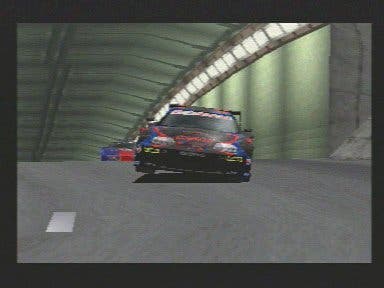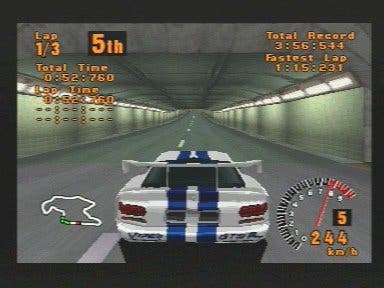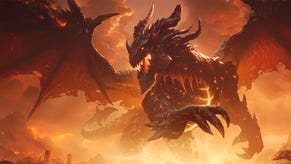Retrospective: Gran Turismo
Rear view.
Undoubtedly the car selection, which included everyday models just about anyone could identify with, played a massive role. At a time when nearly every driving title featured just race-prepared or supercar examples, here was a game that enabled Joe and Jane Average to jump into the virtual interpretation of the car they had parked on their drive.
The automotive theme ensured widespread appeal, too (there's a reason why driving games have traditionally always remained in the top three most popular genres) but the level of realism and the nature of the content brought on board car lovers who dabble in games, not just gamers who are into cars. And the RPG tuning structure, aside from instigating an urge to screech onto the tarmac to find out how a newly installed part now made your ride sound, handle and perform - an intrinsic attraction at the core of the GT experience - also acted as a natural difficulty curve by getting players to progressively work their way up to more powerful machinery.
True, arcade driving aficionados at the time pointed out that if what you wanted was realism, you should get into one of the cars and go for a drive. They argued video games should be about pure unadulterated fun and escapism, not boring pseudo recreations of everyday life. The key flaw in that argument - other than the obvious irony at the heart of such criticism, which we'll deal with in a moment - is that you can't thrash cars on real roads without running the risk of being booked by the police, killing yourself, or worse, killing others.

Alternatively, not everyone can rent, let alone buy an Aston Martin DB7. Even those that can wouldn't be able to experience a Mitsubishi FTO LM Edition, regardless of how much money they were willing to spend - available only as a reward from one of Gran Turismo's championships, this memorable 4WD beauty is a fantasy creation by the GT team in a bid to come up with the perfect race vehicle.
By today's standards Polyphony's early effort may have been some way from reality, but for those willing to strap themselves along for the ride, Gran Turismo offered a glimpse of what it might be like to own one of these machines and beyond - tinkering long enough in the tuning shop could see you create a 1000bhp monster from a family saloon to then find out what it would take to tame such a beast.
Perhaps most crucial, then, is the game's aspirational quality. Not only could you drive your dad's Honda Prelude without having to beg him for the keys, you could stick 20 or 30 thousand under the hood, fit a zaust the size of the Eurotunnel, wrap the rims in race rubber and head down to a circuit of your choice in order to decimate the competition.

Like any game, it isn't perfect. Turning up at events with massively overpowered machinery and winning effortlessly is actually one of the game's key failings - both structurally and morally. Then there's the crushingly drone-like AI (even by the day's standards), the limited number of cars per event (just six, forcing artificially induced close pack racing), and the overall cold, impersonal feel.
On a more serious note, GT's influence - or specifically its success - was such that it sparked an overzealous response from publishers keen to emulate the revenues Sony enjoyed. The resulting efforts were mixed to say the least, but the most undesirable effect of this was that it took far too long for arcade-styled driving examples such as Burnout to break back into the limelight.
Unquestionably, though, when it comes to this game the positives annihilate their counterparts. The driver/car/track purity at the heart of GT's engine ensured a driving experience that captivated players in a manner that no other console title had previously managed. It may be difficult to appreciate now, and if you were too young to have witnessed the pre-GT era, know that it wasn't a desolate, Iron Curtain-styled epoch. We had fabulous fun with Chequered Flag, Pitstop II, REVS, OutRun, Formula One Grand Prix, Virtua Racing, Daytona, The Need for Speed, SEGA Rally, TOCA and countless other favourites.
But know also that the titles that followed Gran Turismo, the titles you grew up with - be it Metropolis Street Racer, the Project Gotham series or the Forza family - not to mention those that your children will subsequently come to cherish, owe their existence to a revolutionary game that, when it first appeared on a cold December day in 1997, both redefined what could be achieved with the genre on a home console while fundamentally altering the course of driving game development forever.








.png?width=291&height=164&fit=crop&quality=80&format=jpg&auto=webp)
